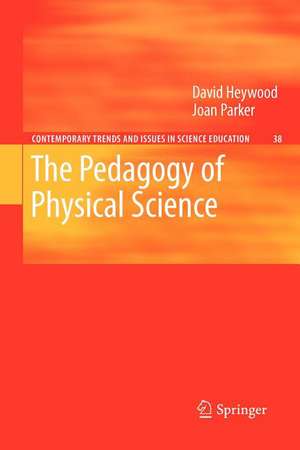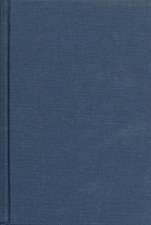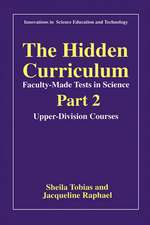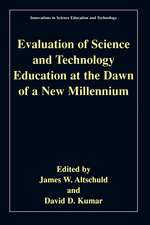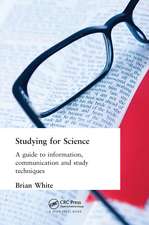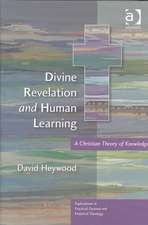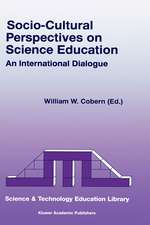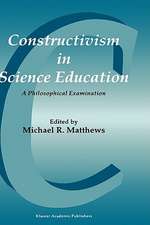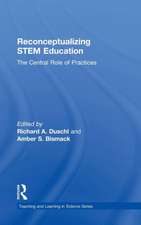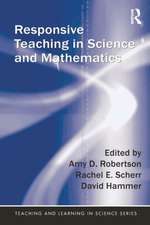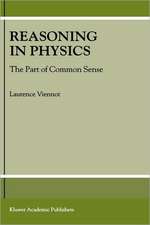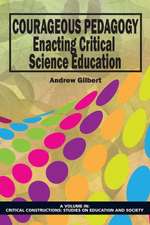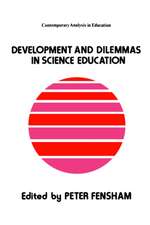The Pedagogy of Physical Science: Contemporary Trends and Issues in Science Education, cartea 38
Autor David Heywood, Joan Parkeren Limba Engleză Paperback – 4 mai 2012
The text demonstrates how professional insight emerges as teachers identify the elements that supported their understanding during their own learning. In this paradigm, professional awareness derives from the practitioner interrogating their own learning and identifying implications for their teaching of science. The book draws on a significant body of critically analysed empirical evidence collated and documented over a five-year period involving large numbers of trainee and practising teachers. It concludes that it is essential to ‘problematize’ subject knowledge, both for learner and teacher.
The book’s theoretical perspective draws on the field of cognitive psychology in learning. In particular, the role of metacognition and cognitive conflict in learning are examined and subsequently applied in a range of contexts. The work offers a unique and refreshing approach in addressing the important professional dimension of supporting teacher understanding of pedagogy and critically examines assumptions in contemporary debates about constructivism in science education.
| Toate formatele și edițiile | Preț | Express |
|---|---|---|
| Paperback (1) | 777.87 lei 39-44 zile | |
| SPRINGER NETHERLANDS – 4 mai 2012 | 777.87 lei 39-44 zile | |
| Hardback (1) | 946.55 lei 6-8 săpt. | |
| SPRINGER NETHERLANDS – 5 feb 2010 | 946.55 lei 6-8 săpt. |
Din seria Contemporary Trends and Issues in Science Education
- 20%
 Preț: 568.91 lei
Preț: 568.91 lei - 20%
 Preț: 814.76 lei
Preț: 814.76 lei - 18%
 Preț: 951.77 lei
Preț: 951.77 lei - 15%
 Preț: 638.43 lei
Preț: 638.43 lei - 15%
 Preț: 636.80 lei
Preț: 636.80 lei - 15%
 Preț: 633.68 lei
Preț: 633.68 lei - 15%
 Preț: 637.46 lei
Preț: 637.46 lei - 18%
 Preț: 951.29 lei
Preț: 951.29 lei - 15%
 Preț: 644.95 lei
Preț: 644.95 lei - 18%
 Preț: 951.91 lei
Preț: 951.91 lei - 18%
 Preț: 1224.06 lei
Preț: 1224.06 lei - 18%
 Preț: 953.65 lei
Preț: 953.65 lei - 15%
 Preț: 641.71 lei
Preț: 641.71 lei - 15%
 Preț: 697.15 lei
Preț: 697.15 lei - 15%
 Preț: 644.18 lei
Preț: 644.18 lei - 15%
 Preț: 640.55 lei
Preț: 640.55 lei - 15%
 Preț: 640.06 lei
Preț: 640.06 lei - 15%
 Preț: 639.08 lei
Preț: 639.08 lei - 18%
 Preț: 1388.68 lei
Preț: 1388.68 lei -
 Preț: 389.31 lei
Preț: 389.31 lei - 15%
 Preț: 465.66 lei
Preț: 465.66 lei - 18%
 Preț: 1832.08 lei
Preț: 1832.08 lei - 15%
 Preț: 641.85 lei
Preț: 641.85 lei -
 Preț: 398.15 lei
Preț: 398.15 lei - 15%
 Preț: 644.18 lei
Preț: 644.18 lei - 18%
 Preț: 945.47 lei
Preț: 945.47 lei - 15%
 Preț: 644.30 lei
Preț: 644.30 lei - 18%
 Preț: 1215.04 lei
Preț: 1215.04 lei
Preț: 777.87 lei
Preț vechi: 1023.52 lei
-24% Nou
Puncte Express: 1167
Preț estimativ în valută:
148.88€ • 154.85$ • 124.76£
148.88€ • 154.85$ • 124.76£
Carte tipărită la comandă
Livrare economică 10-15 martie
Preluare comenzi: 021 569.72.76
Specificații
ISBN-13: 9789400731592
ISBN-10: 9400731590
Pagini: 212
Ilustrații: XII, 197 p.
Dimensiuni: 155 x 235 x 11 mm
Greutate: 0.3 kg
Ediția:2010
Editura: SPRINGER NETHERLANDS
Colecția Springer
Seria Contemporary Trends and Issues in Science Education
Locul publicării:Dordrecht, Netherlands
ISBN-10: 9400731590
Pagini: 212
Ilustrații: XII, 197 p.
Dimensiuni: 155 x 235 x 11 mm
Greutate: 0.3 kg
Ediția:2010
Editura: SPRINGER NETHERLANDS
Colecția Springer
Seria Contemporary Trends and Issues in Science Education
Locul publicării:Dordrecht, Netherlands
Public țintă
ResearchCuprins
One: Introduction. Two: Conceptual Change And Learning About Forces. 1. The Challenge Of Learning About Forces And Motion. 2. Conceptual Change: A Brief Historical Perspective. 3. Conceptual Change In Action: Primary Teachers Learning About Forces. 4. Some Conclusions And Implications. Three: The Role Of Analogies In Learning. 1. Learning About Simple Circuits. 2. Applying Analogies To Simple Circuits. 3. Implications For Pedagogy. 4. Explanation And Meaning. 6. Practical Implications For Pedagogy: Teaching. 7. Teacher Subject And Pedagogic Knowledge. Four: Cognitive Conflict And The Formation Of Shadows. 1. Promoting Conceptual Change Through Cognitive Conflict. 2. The Challenge Presented By The Conceptual Domain Of Light. 3. Exploring The Impact Of Cognitive Conflict In Learning About Shadows. 4. Resolving The Conflict . 5. The Emergence Of Pedagogical Insight. 6. Discussion. 7. Some Concluding Remarks. Five: Language Interpretation And Meaning . 1. Conceptualising How Language Works . 2. Sign And Signification. 3. Signification In Science Learning. 4. Interpretation And Meaning. Six: Metacognition And Developing Understanding Of Simple Astronomical Events. 1. Metacognition And Learning. 2. The Conceptual Domain Of The Earth And Beyond. 3. Mapping Movement In Conceptual Understanding About Simple Astronomical Events. 4. Insights Identified Through Adopting A Metacognitive Approach To Learning. 5. Discussion. Seven: The Subject Matter Learning Audit And The Generation Of Pedagogical Content Knowledge. 1. Teacher Knowledge. 2. The Subject Matter Learning Audit (SMLA) . 3. A SMLA Case Study (Stage 1): Learning About Forces. 4. A SMLA Case Study (Stage 2): The Individual National Curriculum SMLA. 5. A SMLA Case Study (Stage 3): Scheme Of Work SMLA. 6. Discussion And Implications For Teacher Education.
Textul de pe ultima copertă
In the science classroom, there are some ideas that are as difficult for young students to grasp as they are for teachers to explain. Forces, electricity, light, and basic astronomy are all examples of conceptual domains that come into this category. How should a teacher teach them? The authors of this monograph reject the traditional separation of subject and pedagogic knowledge. They believe that to develop effective teaching for meaningful learning in science, we must identify how teachers themselves interpret difficult ideas in science and, in particular, what supports their own learning in coming to a professional understanding of how to teach science concepts to young children. To do so, they analyzed trainee and practising teachers’ responses to engaging with difficult ideas when learning science in higher education settings.
The text demonstrates how professional insight emerges as teachers identify the elements that supported their understanding during their own learning. In this paradigm, professional awareness derives from the practitioner interrogating their own learning and identifying implications for their teaching of science. The book draws on a significant body of critically analysed empirical evidence collated and documented over a five-year period involving large numbers of trainee and practising teachers. It concludes that it is essential to ‘problematize’ subject knowledge, both for learner and teacher.
The book’s theoretical perspective draws on the field of cognitive psychology in learning. In particular, the role of metacognition and cognitive conflict in learning are examined and subsequently applied in a range of contexts. The work offers a unique and refreshing approach in addressing the important professional dimension of supporting teacher understanding of pedagogy and critically examines assumptions in contemporary debates about constructivism in science education.
The text demonstrates how professional insight emerges as teachers identify the elements that supported their understanding during their own learning. In this paradigm, professional awareness derives from the practitioner interrogating their own learning and identifying implications for their teaching of science. The book draws on a significant body of critically analysed empirical evidence collated and documented over a five-year period involving large numbers of trainee and practising teachers. It concludes that it is essential to ‘problematize’ subject knowledge, both for learner and teacher.
The book’s theoretical perspective draws on the field of cognitive psychology in learning. In particular, the role of metacognition and cognitive conflict in learning are examined and subsequently applied in a range of contexts. The work offers a unique and refreshing approach in addressing the important professional dimension of supporting teacher understanding of pedagogy and critically examines assumptions in contemporary debates about constructivism in science education.
Caracteristici
Provides a unique perspective on the pedagogy of physical science derived from researching teachers’ learning Identifies the nature of explanation and learning in science and supports with research evidence from teachers’ learning in what are considered traditionally difficult and abstract conceptual areas Critically informs assumptions about teacher science subject knowledge the nature of learning in science and the presentation of science knowledge in the curriculum
